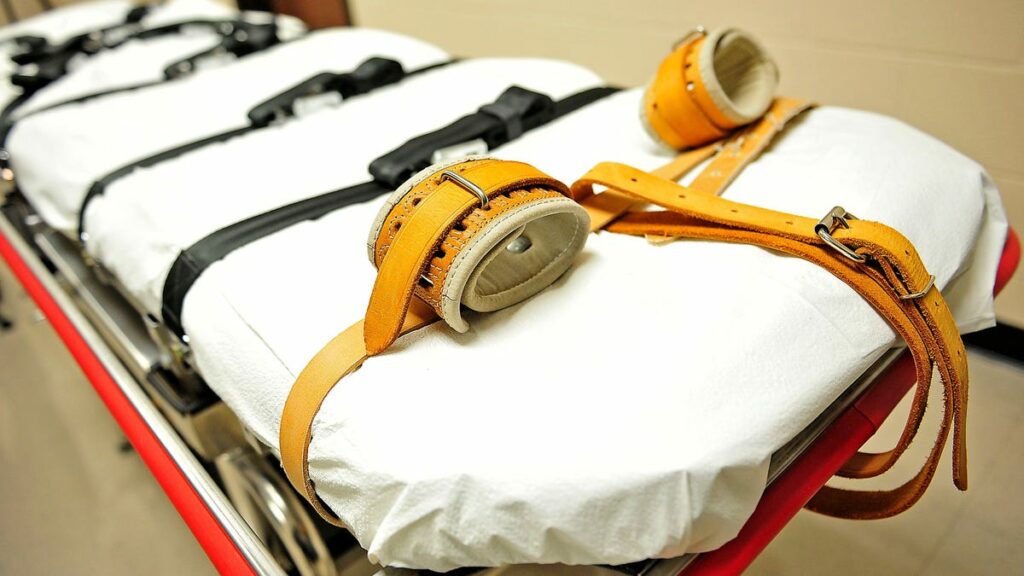Civil appeals vs criminal appeals: What you should know
Explore the criminal and civil appeals processes in court cases including key steps and the importance of understanding appeals for ensuring justice.
A lethal injection expert has asked the Arizona Supreme Court to deny the attorney general’s request for an execution warrant for Aaron Gunches, citing concerns about the state’s death penalty process.
Corinna Barrett Lain, a law professor at the University of Richmond School of Law, filed a brief in Gunches’ case on Monday to argue Arizona has not changed its lethal injection protocols sufficiently to prevent him from experiencing severe pain in the execution chamber.
Arizona “has a long history of execution failures that raise critical questions about the humanity, transparency, and constitutionality of executions by lethal injection,” Lain’s brief states. “Arizona claims that it has remedied its operational deficiencies and is prepared to conduct executions in a legal manner. … However, the most concerning aspects of Arizona’s protocol have not changed one iota, dooming the state to tragic recurrences of the same problems.”
Arizona’s drug of choice for lethal injections — pentobarbital — “is sure or very likely to cause acute pulmonary edema, causing prisoners to drown in their own fluids,” according to Lain’s court filing. “Acute pulmonary edema is excruciatingly painful, causing individuals to experience the sensation of being waterboarded.”
Lain is a constitutional historian, former prosecutor and “one of the nation’s leading authorities on capital punishment,” according to the brief. She has written a soon-to-be-published book on lethal injection in America that includes research on Arizona.
Gunches was sentenced to death for the 2002 murder of Ted Price, a former longtime boyfriend of Gunches’ girlfriend. He kidnapped and then shot Price multiple times in a desert area off the Beeline Highway.
Arizona Attorney General Kris Mayes in December began the process of seeking a warrant of execution for Gunches from the state’s Supreme Court.
Gunches supports the efforts to carry out his sentence. On Dec. 31, he filed a motion requesting that the Supreme Court expedite the warrant’s issuance and schedule his execution for Feb. 14. “This sentence is long overdue and should not be delayed any further,” Gunches wrote.
Arizona killed three men in 2022, but execution teams struggled to perform the lethal injections. The 2022 executions followed a multiyear pause in executions in Arizona after it took nearly two hours for state officials to kill Joseph Wood via lethal injection in 2014.
Upon taking office in 2023, Gov. Katie Hobbs and Mayes suspended capital punishment while a review of Arizona’s death penalty process was conducted.
Retired U.S. Magistrate Judge David Duncan was hired as a commissioner to undertake that review, the scope of which was laid out in an executive order that also called for a written report.
But Hobbs fired Duncan before his review was complete, despite his findings that lethal injection is “unreliable, unworkable and unacceptably prone to errors.” The governor and Mayes said an internal review conducted by the state Department of Corrections, Rehabilitation and Reentry provided adequate assurance that Arizona was ready to resume executions.
Lain’s brief said Hobbs’ decision to fire Duncan before his death penalty review was complete was consistent with Arizona’s problematic history of secrecy about executions.
“Arizona’s answer to its inability to actually fix what ails lethal injection has historically been secrecy, and its unexplained decision to terminate Judge Duncan’s review is the latest and most blatant example,” attorneys for Lain write.
The state Supreme Court should not issue an execution warrant for Gunches without there first being “a full and fair-minded assessment of the facts” about lethal injection in Arizona, Lain’s brief said.
Lain also cited her concerns about Arizona’s “dubious” sourcing and compounding of its lethal injection drug as well as “its repeatedly broken promises to use qualified personnel” as reasons to continue the state’s death penalty moratorium.
The Supreme Court was scheduled to meet Jan. 7 to discuss Mayes’ death warrant request.
Have a news tip? Reach the reporter at jjenkins@arizonarepublic.com or 812-243-5582. Follow him on X, formerly known as Twitter, @JimmyJenkins.
Source link : http://www.bing.com/news/apiclick.aspx?ref=FexRss&aid=&tid=677ed489bb2a4a3eb0e66597fac6efdb&url=https%3A%2F%2Fcelticswire.usatoday.com%2Fstory%2Fnews%2Flocal%2Fphoenix%2F2025%2F01%2F08%2Farizona-not-ready-to-resume-death-penalty-expert-says%2F77497214007%2F&c=6347772324738794065&mkt=en-us
Author :
Publish date : 2025-01-07 23:02:00
Copyright for syndicated content belongs to the linked Source.
